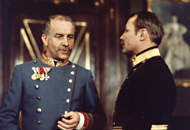Meaning in life
After rereading these texts and the discussion in class, I was able to pick up on more than just the story. Clearly there is a theme of possessions and happiness in life in the Tale, but how does it all intertwine?
The young merchant's son has or has access to just about anything his heart desires and has "loyal" servants in his mannor. Even with all this however and the happiness that it should bring, "The thought of death never left him for long." This statement is true for much of the Tale and in the end the merchant's son dies from, as he descibes it, a grotesque horse that bascially was death incarnate. However there is more to this story than that. The merchant's son fills his life with worldly possessions but is always melancholy and anxious about his servants leaving him. Even though the story gives only slight clues about there being any desire for the servants to leave, the merchant's son is on edge, because even though they don't, they could.
It seems that the merchant's son has kept himself in his mannor for so long, he is quite removed from the real world and doesn't understand how it works. This is why when he decides to go out, in an attempt to fix his world, he is fine at first, but then becomes confused and sees everything as being ugly. After finding no answer at the diplomat's residence, the merchant's son seems lost and searches the city a bit, and eventually finds some jewelry that seems to help him restore a bit of order to his world; however, the merchant's son's world falls into disarry when he enters the "nature" of the greenhouse. If this was the closest the merchant's son got to true nature, then it is understanable that this is where he becomes very scared and the fear of death seems to encompass him, but he is still drawn in.
The end of the story I feel is not as deep as the middle, although it is quite possible I missed some at the end, but it is interesting that a living animal is death to him, and that he dies in an empty room with out any of his possessions and in the end, curses his servants and blames them for all his own actions that he did for them.



1 comment:
I also thought it was really interesting that the merchant's son was at odds with nature and was unable to really understand people around him and communicate with others in a meaningful way. His perception of the world is that it is a scary place--he thinks his servants are watching (and judging?) him, he is worried that they'll leave him (even though he doesn't interact with them very much) and I think it's partly because he's afraid of what his life would be like without other people to act as buffers for the outside world. Then, when he does have to venture into the city, he is so far removed from it all that he fears everything, even down to a small child.
Post a Comment